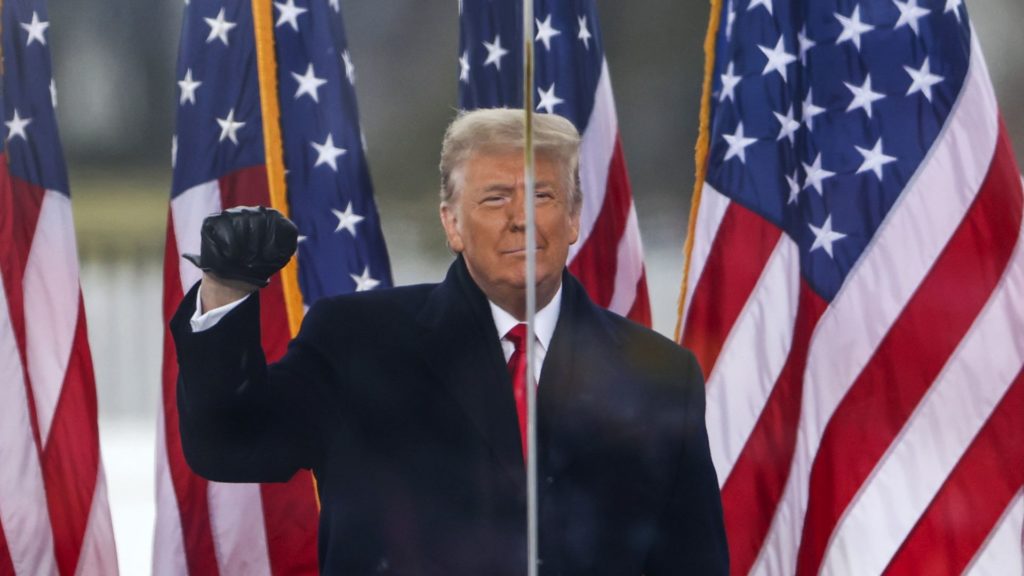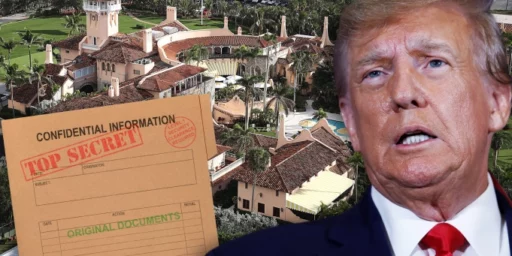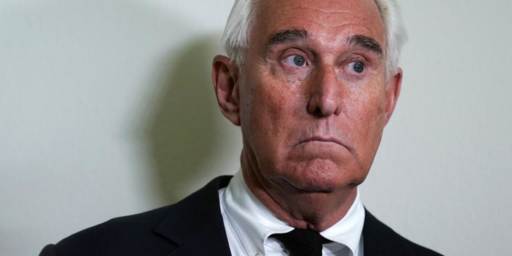Coverage of the Trump Indictment Keeps Emphasizing the Wrong Thing
The problem is not the indictment; it is the indicted.

I started reading a piece (Trump’s indictment plus candidacy could endanger democracy and the rule of law) by Dan Balz, Ann E. Marimow, and Perry Stein in WaPo. I stopped reading when I hit the following paragraph and started writing (emphasis mine):
Not since the Vietnam War in the 1960s or perhaps the mid-19th century before the Civil War has the country’s governing structure faced such disunity and peril, given the unprecedented nature of a federal criminal indictment of a former president compounded by the fact that Trump has been charged by the Justice Department in the administration of the Democrat who defeated him in 2020 and who is his likeliest general election opponent in 2024, if Trump is nominated again by the Republican Party.
I have often seen a formulation of this type, which puts the focus on the “unprecedented nature” of the indictment. And, yes, it is indisputably true that this is the first time a former president has been indicted by the federal government and the first time that one of the frontrunners was under indictment (other presidential candidates have been charged, most famously Eugene V. Debs who campaigned from prison).
So, yes, the indictment is unprecedented. But the fundamental issue is not the indictment, is it is the indicted. The truly unique variable here is not a Justice Department that tried to enforce the law and eventually had to resort to warrants and raids to do so. No, the truly unique variable here is that Donald Trump continues to behave in a way that is unprecedented for a presidential candidate, a president, and a former president.
And while he is innocent until proven guilty, the reality here is that his behavior is the problem, not the behavior of the DoJ. Yet, as with most things about press coverage of all things Trump, the standard way of covering these things is placing the emphasis in the wrong place, in my view.
The problem is not the indictment, unprecedented or not. The problem is a deeply flawed man ever being in a position to be a major party’s nominee in the first place. The problem is an autocrat wannabe occupying the White House. The problem is that he continues to have enough support to try again.
The problem, further, is that when the Republican Party had the chance in January of 2021 to use his second impeachment trial to bar him from seeking further office that they didn’t do it.
Humanity suffers when the petty and vain have power and when those who have the opportunity to act to forestall that person from having more power choose to be cowards focused on short-term payouts.
Having written the above and returned to the reading, I note that the emphasis I am critiquing continues:
The indictment in the case involving Trump’s retention of classified government documents coming in the midst of a presidential campaign raises legal questions about what might happen if he were to be convicted and elected. Could Trump pardon himself? Could he serve as president after a conviction? Could he run for office from a prison cell? Depending on events, those could become ripe for adjudication.
These are legitimate questions, but I object to the degree to which Trump is a passive actor in the conversation.
It is not the indictment that is the root cause. The root cause is Trump’s active (alleged) criminal activity (although I would note that regardless of his guilt in a court of law if he had just handed the document back when repeatedly asked then the indictment would never have happened). The indictment is not something that just happened to Trump. Trump caused it to happen.
And how the country, or more specifically certain subsets thereof react to the indictment and its aftermath is very much on Trump. As Jack Goldsmith is quoted in the piece notes, “Convicted or not, nominee or not, we can assume [Trump] is going to inflame this to the maximum and his supporters will inflame this to the maximum.” That is a choice by a man who is ostensibly a leader. But, of course, Trump is not the kind of leader who cares about those he leads. Instead, he is the kind of leader who uses his followers for his own ends.
In fairness, the piece does note the following:
For the past three years, Trump has sought to shred long-standing trust in the country’s electoral process, claiming falsely that the 2020 election was rigged and stolen. With no supporting evidence to buttress those claims, public opinion surveys suggest that Trump nonetheless has persuaded millions of Republican voters that President Biden was not legitimately elected. Election denialism now infects a large portion of the Republican Party.
With the new indictment, Trump is again taking direct aim at the integrity of law enforcement agencies, the judicial system and, ultimately, public faith in the rule of law. He did this as president, and now, in the aftermath of his 37 charges in the documents case — to which he pleaded not guilty — he has escalated those attacks in an effort to discredit the Justice Department and the FBI, claiming he is a victim of a politicized “witch hunt.”
The piece is largely about how the system may have to react to extreme stress. I am suggesting, however, that the stress is being caused by the nature of Trump as a person, including his actions and character, not by the indictment. The indictment is the system trying to provide a corrective to Trump’s behavior. I think this needs to be more clearly upfront in these discussions.
It simply is not the case that the basic application of the law should be taking the blame here. Instead, we need to be asking ourselves how to better filter out people like Trump from our national politics. If the lesson is, well, indicting Trump was a mistake then we are saying that the rule of law is not worth having if it upsets someone who wants to use their unique position as candidate/president/ex-president to ignore the law.
The other variable that I will note, and that is a subtext to the conversation, is that the US has a terrible history of not holding the powerful to account because of our fears of what the consequences might be. The glaring examples are the post-Civil War period and Richard Nixon. Every time we don’t engage in the application of consequences for bad behavior, we just make future bad behavior all the easier (and more likely, therefore).
So, look, I understand the following problem:
Amar said he worries about the documents case because, he estimated, “There are 30 to 40 percent of America that would never think Trump’s conviction was fair, no matter what the evidence shows. They’ve made up their minds that this is a witch hunt.”
But if that is the standard, no ex-president will ever have to worry about criminal liability. How would that be good for democracy?
The possibility of an indictment in the Jan. 6 investigation adds another layer of risk. Goldsmith sees that case as more fraught legally than the documents case and therefore potentially harder for prosecutors to win. It also carries additional political consequences. “Doing two cases at once, will it be seen as piling on?” he said. “Will it be seen as making things worse?”
I am sure some will see it as piling on. And yes, it could make the general political climate worse. But if there is strong evidence of a chargeable offense by Trump in connection with January 6th, then I would argue not prosecuting would be far worse for democracy. If a president can engage actively in an insurrection aimed at overturning an election, then we will deserve it when such an action is successful the next time around.
I think the thing about the tone of the piece is that it treats Trump’s current legal woes as the main cause of our currently poisonous political climate. But the reality is that we wouldn’t be where we are now with Trump’s descent down that escalator (and other antecedents). As such, I really object to any discussion that treats the indictment(s) are something that is happening to a passive Trump rather than a direct consequence of Trump’s own belligerent, ongoing actions.
In other words, I object to the framing that suggests we might be better off without the indictment as if the indictment itself is the problem. That, somehow, it is the rule of the law that is the core of a potential crisis. The indictment is not the problem; the problem is Trump and his ongoing behavior. He is not a passive actor in an of this.






As Mitt Romney said, Trump brought all this on himself.
Trump reminds me of a guy with whom I once had a summer job: If there were nine honest, profitable ways to do something, he’d invariably pick the tenth dishonest, unprofitable way. He was compelled to be a crook, even at the sacrifice of his own best interests.
No, no,no,no!
The problem is the Republican Party and its ongoing behavior, including the manipulation of the Republican base voters by disinformation and lies.
All Trump is responsible for is seeing an opportunity and exploiting it.
I like this as a detailed analysis of where we are:
https://thomaszimmer.substack.com/p/how-republicans-give-themselves-permission?utm_source=substack&utm_medium=email
We have arrived now to a point where there is no line the GOP will not do, no bounds on their behavior at all.
@charontwo: I did address that as well in the post.
The press are in business, the coverage is what their viewers and readers want. Take note of Fox broadcasting lies so as not to lose viewers to OAN and Newsmax.
@Steven L. Taylor:
Yes, you did address Republicans and their base in your post. Full credit for that. But, I think your post may suffer similarly from “placing the emphasis in the wrong place,” this time in my view.
Yes, yes, yes… The problem is not the indictment; it is the indicted.
But, I would say it is more pertinent to say The problem is not Trump; it is Trumpism (read as anti-majoritarian authoritarianism. The reason for that is should the mounting legal problems rid us of the troublesome Trump, radicalism will continue to hold sway in the GOP. Nikki Haley will be only modestly less dangerous as POTUS if Congress during her term is powerfully influenced by the likes of MTG and Josh Hawley and the lot of them are still needing to play to their radical base voters to maintain power.
The GOP establishment continues to back Trump despite a mountain of reasons not to. That is the problem.
Brilliant. Quoted for emphasis.
Mark Esper, second of Trump’s Secretaries of Defense, told CNN that Trump was a security threat, and would continue to be so if he got re-elected in 2024.
Why is Spiro Agnew not brought up as a model for the indictment. He was an actual sitting VP at the time he was investigated by the government and with the same party. He also argued that as a sitting VP he was not indictable. Didn’t work. He eventually pled guilty nolo contendre to a single charge and resigned.
https://en.wikipedia.org/wiki/Spiro_Agnew
@Scott:
Because Agnew might have been a crook, but he was sane. Trump isn’t. The fear that he might do something awful lingers.
Really good piece. The one thing I’ll say about Nixon is that there was an implicit understanding after he resigned and was pardoned that his political career was over. He could write his books, he could make money, he could be a foreign policy elder statesman, but never again could he run for anything. Of course you couldn’t make that deal with Trump because he couldn’t be trusted to uphold it.
Yes, this is unprecedented because Trump’s actions are unprecedented. (Except for Nixon/Ford.) Seems obvious, doesn’t it? But that doesn’t fit the bothsides, horse race framework.
You have done so, Dr. T. So much of the supposedly liberal MSM are unable to. Perhaps it feels to much like making a judgement.
It’s bad enough that it’s only treason if you lose; removing the risk of treason even from the loser simply means nothing is treason, so take your best shot.
It’s a tragedy that this indictment was brought before either of the (hopefully) pending indictments for trying to overturn the election result. It’s not like getting Capone for tax fraud; it’s like getting him for jaywalking. I can’t believe many Americans care very much that a president who had virtually unlimited authority over the storage and disposal of sensitive documents for four years kept a few of them when he left office. Yes I understand the charges are concerned only with his refusal to give them back and his obstruction of the government’s attempts to retrieve them, but I doubt many Americans have dived into the finer detail of it all. Trump had classified documents, Pence had classified documents, Biden had classified documents, but only Trump has been charged – that I believe is the way casual news readers will perceive it.
The risk is that if and when the truly serious charges are laid, the general public led by the tabloid newspapers and cable TV will roll them into one big drama about department store rapes and paying off porn stars and keeping documents and being blamed for January 6, and never see clearly the enormous crimes that Trump and his inner circles tried to commit against the nation.
@Ken_L:
This is partly right, partly wrong.
True that many voters, especially Republicans, see this as unimportant, which is what their media and politicians tell them.
Wrong about this actually being unimportant, MAL is a target for foreign agents, and you do not know who has seen very sensitive material that is stored insecurely. Looking at comparable cases, the government usually treats this sort of offense very harshly.
Other countries, like Five Eyes, will now be fearful of sharing information with the U.S.
I think it’s also wrong to view Trump’s actions merely as the blunders of a careless man who never had a handle on the duties of his office. In particular, I’d like to know why Trump made it his business to withhold all of these highly classified documents. I doubt this was done strictly to provide himself with trophies from his time in office. That’s an explanation which seems contrived to conceal potentially darker motives (e.g. the intention to monetize this information by selective leaking or to attempt to use possession of the information as a bargaining chip against federal prosecution). We should have learned by now that, where Donald Trump is concerned, we always must consider the most selfish and nefarious motives.